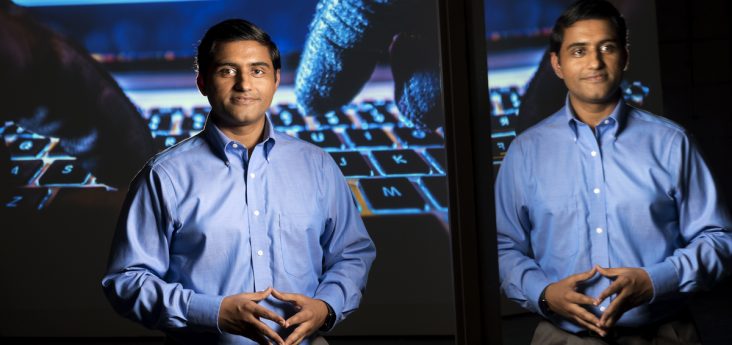UA Little Rock makes COSMOS a designated research center
by August 19, 2020 9:06 pm 568 views

Dr. Nitin Agarwal.
The University of Arkansas at Little Rock Collaboratorium for Social Media and Online Behavioral Studies (COSMOS) Lab has received approval from the Arkansas Department of Education (ADHE) to become an established research center on campus.
“By designating COSMOS as a formal center, UA Little Rock will be a leader and pioneer in social media analytics and social media forecasting,” said Dr. Nitin Agarwal, director of COSMOS and Maulden-Entergy Endowed Chair and Distinguished Professor in the Department of Information Science. “When you look at the transformational research being conducted at COSMOS and the students who have gone on to do great things, it’s nothing short of spectacular. I am thankful to the Arkansas Department of Higher Education and Board of Trustees for their support.”
The Board of Trustees of the University of Arkansas approved the creation of a new administrative unit for COSMOS in May, followed by approval by the ADHE in July. The designation represents the state’s endorsement of the need for the program and confirmation that UA Little Rock should expand the program.
“The work that Dr. Agarwal and his COSMOS team are doing is truly transformative and is already having wide-ranging impacts in the areas of defense, business, and politics,” said Dr. Brian Berry, vice provost of research and dean of the graduate school. “The establishment of COSMOS as an official center will provide the platform and infrastructure needed to increase the impact of this work even more.”
Since it began in 2014, COSMOS has brought in more than $20 million in research funding from the U.S. National Science Foundation, U.S. Office of Naval Research, U.S. Air Force Research Lab, U.S. Army Research Office, U.S. Defense Advanced Research Projects Agency, the Department of Defense, and NATO.
“Dr. Agarwal’s research is cutting edge as it focuses on social media and both the technical and social impacts,” said Dr. Lawrence Whitman, dean of the Donaghey College of Science, Technology, Engineering, and Mathematics. “He is working with a wide variety of organizations with different applications and how social media affects our lives, both locally and globally. His work and his students’ work are impressive, impactful, and interesting. I am glad to see the state recognize his work with this center designation as it will further expand the reach and recognition of his work.”
Dr. Agarwal and his team of about 30 researchers have studied phenomena that he describes as the good, bad, and the ugly of cyber behaviors. These include cyber campaigns promoting Saudi Arabian women’s right to drive, anti-NATO propaganda campaigns, predictive modeling of cyber flash mobs, medical informatics for patient care coordination and engagement, and Russian interference in western democracies. Most recently, he and his team are working with the Office of the Arkansas Attorney General to identify and track coronavirus-related scams and social media disinformation.
“We are researching deviant and malicious behaviors on social media platforms, whether it’s related to misinformation about health behaviors and COVID-19, misinformation during elections, or propaganda that is targeting the U.S. and its allies like NATO,” Agarwal said. “We are trying to solve hard and thorny problems of the real world. Our work has significant contributions for the sciences as we are developing new applications and tools to collect information.”
Dr. Agarwal and COSMOS researchers have created Blogtrackers and YouTube trackers applications through research supported by federal grants. These applications track information providers and narratives as misinformation is disseminated through social media networks including blogs, YouTube, and Twitter.
“Most researchers focus on disinformation on Twitter and Facebook, and our research explores under-explored platforms as well,” said Dr. Nihal Hussain, a 2019 UA Little Rock graduate and a postdoctoral researcher at COSMOS. “Blogs and YouTube provide malicious actors a platform to frame their narratives that can influence or polarize crowds. In most cases, disinformation is hosted on these platforms that is later disseminated on Twitter and Facebook.”
Dr. Agarwal credits his decision to join UA Little Rock in 2009 to the late Dr. Mary Good, the founding dean of the College of Engineering and Information Technology, who “had a vision of having a research program dedicated to web science.”
“She had the vision to see this was a growing area that would have a lot of potential in the future,” Dr. Agarwal said.
In 2018, Dr. Agarwal was named a fellow of the Arkansas Research Alliance, who thinks that research from COSMOS will have a positive impact on the region.
“Nitin is a very strong member of the ARA academy, and we are excited about his evolution at UA Little Rock,” said Dr. Jerry Adams, president and CEO of Arkansas Research Alliance. “This is a part of his rising trajectory in terms of added value to UA Little Rock, the state, and the nation. We are excited about this announcement and look forward to the cutting edge research from COSMOS.”
The mission of COSMOS is to coach motivated students to develop solutions for real-world problems that contribute to social good and innovation. So far, more than 60 college students have worked at COSMOS.
“COSMOS’ accomplishments wouldn’t have been possible without the contributions of the numerous exceptional students over the years,” Dr. Agarwal said.
